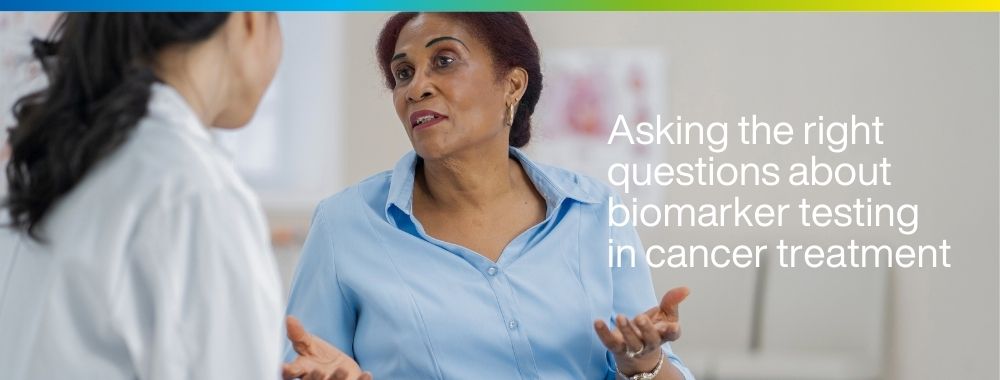
Daiichi Sankyo is dedicated to advancing both awareness and adoption of biomarker testing, alongside developing therapies that are designed to deliver greater impact for cancers associated with specific biomarkers. We will always work to ensure that patients, caregivers and physicians have the information and resources they need to make treatment decisions based on precise biomarker data.
Keep reading to find answers to important questions patients might have about precision medicine and the role of biomarker testing in cancer treatment.
1. What is precision medicine?
Precision medicine, sometimes called personalized medicine, is an approach that involves tailoring treatments to individual patients based on the genetic or molecular characteristics of their disease and other factors.
The foundation of precision medicine is targeted therapy aimed at specific genetic markers on tumors that control how the cancer grows and spreads.
2. What is biomarker testing and why is it important?
Once a cancer diagnosis is confirmed, patients may undergo comprehensive biomarker testing, done by biopsy or blood test, to provide doctors with more information about the cancer, including whether there are signs of genetic or molecular mutations.
The testing results enable physicians to determine whether a patient may be a candidate for targeted therapy and to select the optimal therapy to potentially improve their survival and quality of life.
To help identify patients for appropriate targeted therapies, predictive biomarker testing is an essential step in cancer care.
The identification of actionable molecular biomarkers and treatment with matched targeted therapies have been associated with favorable outcomes for some patients.
As with any medical testing or treatment, you should consult with your doctor to determine which next steps are right for you.
 A message from Tomek Szczudlo, Vice President, Global Oncology Medical Affairs
A message from Tomek Szczudlo, Vice President, Global Oncology Medical Affairs
Our Efforts to Make Precision Medicine Available to All
"Personalized treatment is now a reality for many cancer patients, thanks to the ongoing development of new targeted therapies. The concept of precision medicine is at the core of oncology research and development at Daiichi Sankyo, and we are continually working to identify new treatment targets, investigate underlying disease biology, and develop new therapeutic options. But, our work is far from over.
As we bring new treatments to more patients around the world, we are also supporting efforts to make precision medicine innovations equally accessible to all patients. We understand there are real-world inconsistencies in biomarker testing and we are supporting advocacy partners who are working to empower patients in managing their care."
3. What does a patient need to know about biomarker testing?
Daiichi Sankyo has learned directly from patients and through our advocacy partners that patients are not always aware of biomarker testing and its important role in treatment.
We encourage patients to discuss with their doctors whether comprehensive biomarker testing is planned as part of their care and maintain an open dialogue about the role it will play in their treatment plan.
For timely discussions about treatment decisions, patients should discuss biomarker testing as soon after diagnosis as possible—even before a biopsy and continue to raise the topic of biomarker testing periodically over the course of their treatment. It’s important to keep in mind that new medicines are approved, new clinical trials are initiated, and new research findings are reported continually. Biomarker testing can be important to healthcare teams in identifying the appropriate treatment plan for an individual patient. However, testing may not be possible for all patients and tests may not ultimately lead to use of a targeted therapy.
4. What should a patient be asking about biomarker testing?
Following are important questions for a patient to start a conversation with their healthcare team about biomarker testing.
- What type of cancer do I have? (For example: breast, lung, blood cancer.)
- Are there biomarkers relative to my disease? If yes, has comprehensive biomarker testing been conducted?
- What were the results of my biomarker tests?
- Does my cancer contain any biomarkers?
- Could you review the results with me and explain the treatment recommendations based on the comprehensive biomarker test and other tests?
5. What is being done to address the lack of consistent biomarker testing during cancer treatment?
Ensuring that all patients with cancer receive biomarker-driven care remains a challenge. A number of factors contribute to this challenge, including the ordering of a biomarker test.
Daiichi Sankyo is actively collaborating with patient advocacy partners to develop solutions that address the gaps in biomarker testing. We strive to honor the patient credo of “No Decision About Me, Without Me” and believe every person with cancer should know whether biomarkers are impacting, even fueling, their cancer so they can advocate and be active participants in their treatment and care decisions.
Suggestions
While our lungs support our very existence, we often don’t recognize that something isn’t quite right with our lung health. Get answers to questions about lung cancer and listen to empowered patients...
Growing up in a Spanish-speaking home, I was the family translator—a role that became particularly challenging when my mother was diagnosed with breast cancer. My family relied on me…
Each patient journey is unique for those faced with a breast cancer diagnosis. At Daiichi Sankyo, we strive to deepen our understanding beyond the scientific aspects, distinguishing between the personal needs of patients with early-stage versus metastatic breast cancer.